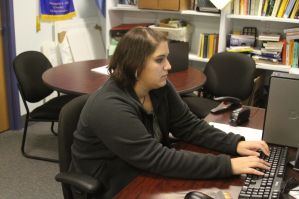 In her junior year of high school, Daniellie DiBartolo viewed a film at home with her grandmother titled “Human Trafficking.” While she had not known then, a seed had been planted and her interest continued to stem into her college career.
In her junior year of high school, Daniellie DiBartolo viewed a film at home with her grandmother titled “Human Trafficking.” While she had not known then, a seed had been planted and her interest continued to stem into her college career.
“When I was around 16 or 17 I saw the movie ‘Human Trafficking’ on TV,” DiBartolo said of her first time ever learning about the problem. “I saw that it was horrible but I didn’t really think anything of it afterwards.”
DiBartolo enrolled at Cabrini College and by fate was placed into a course that reintroduced her to what would be the focus of her college career.
“As a sophomore we read a book in my Engagements with the Common Good course,” DiBartolo said. “It brought the issue back up.”
DiBartolo read “Not For Sale” by David Batstone with classmates and felt provoked by the stories in the book, enough to do something about it.
“We talked about the book in class. I had said that this [human trafficking] is something that we all say is horrible. I felt like we all thought that and said that, but we weren’t doing anything about it. And that really bothered me,” DiBartolo said.
Her eagerness to do something about it came to life when Batstone presented at Cabrini last year. With an audience of over 400 students, Batstone engaged and invited students to enroll in his Not For Sale Academy. DiBartolo was the only person who took up Batstone’s challenge.
“His call to action made me want to do something about it. After he came I went to my class and said I don’t want this to be another horrible thing that we hear about and don’t do anything about,” DiBartolo said.
DiBartolo was persistent, proposing to the Honors program, Academic Affairs and the Wolfington Center to fund her trip to the academy. The school complied and DiBartolo flew to California for a trip that would shape her future.
DiBartolo’s experience resulted in her developing an action plan to increase awareness of human trafficking on campus. But more than that, human trafficking is now a part of her daily life.
“It’s built inside me now. I learned their [victims] personal stories and I now take with me,” DiBartolo said.
DiBartolo touched on a specific story. An American woman who grew up sexually abused became sexually exploited by a San Francisco police officer at the age of 16. She continued to be his sexual servant for three years. It was only after she and other young girls mustered enough courage to turn in their owner that the man was arrested.
Unfortunately, the same woman continued to prostitute voluntarily because it was the only life she knew. Only after she and her first son were almost murdered as a consequence to her refusal of his sexual requests, did she quit.
Today this victim, or survivor as many women who have endured trafficking wish to be referred to, is the founder of an aftercare facility in California.
DiBartolo says it was this woman’s story that has allowed her to make this issue a part of her everyday life and conversation.
Her experience at the academy has granted her certification to train social service agencies, law enforcement officers or anyone interested in learning how to identify a commercially sexually exploited person.
DiBartolo’s next goal is to see if Cabrini will allow her to host a week of events centered on human trafficking awareness, including a training session.
“I want to make sure I tell anyone and everyone who is willing to listen about what it is, what it means and that it is happening here and that we can all play a small role in making that difference,” DiBartolo said.
DiBartolo will continue her passion for human trafficking advocacy in parallel to her academic goals. A native from Cherry Hill, N.J., DiBartolo studies sociology, psychology, social work aDiBartolo dreams of making a home for mentally abused and fragile children to provide them with nurturing and loving environments to avoid the possibility of winding up on the wrong path in life.
nd has subconsciously added human trafficking to her coursework. She plans to continue to graduate school to attain a master’s degree in social work with a concentration in clinical health.
“Realizing the abuse and the neglect that goes on in our system and the lack of resources that we’re putting into it is what makes me want to fix this problem in my own backyard,” DiBartolo said. “My calling is to work on the domestic issue at hand.”


